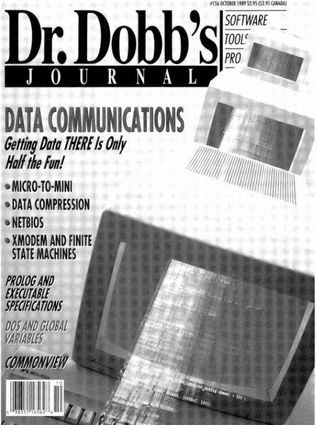
[author : Jonathan Erickson] #Edito
TABLE OF CONTENTS
[author : Mark Servello]
If you’ve been asking yourself what to do with that dust-covered minicomputer in the back room, Mark offers a productive suggestion, and shows you how to do it.
[author : Mark R. Nelson]
We all know that less is better, especially when it comes to data transfer and storage. Mark shows how more can be less, and that’s what data compression is all about.
[author : Costas Menico]
Costas shows you how to take advantage of the high-speed data transfer facilities LANs provide, without having to bite the LAN bullet.
[author : Donald W. Smith]
If the chaos of communications is getting you down, a finite state machine may be what you need. Don describes how to implement one for the XModem protocol.
[author : Ben White]
Reliability and efficiency are the cornerstones of data communications. Ben examines the Hamming-code method of ensuring these qualities and shows you how to implement this approach.
[author : Gregory L. Lazarev]
Gregory discusses how executable specifications can be generated from a data flow diagram using Prolog’s declarative and procedural capabilities.
[author : Jim Mischel]
If you need a way to maintain true system-wide global variables for your DOS applications, Jim’s GLOVAR program should fill the bill.
[author : Noel J. Bergman]
This month in ‘Examining Room,’ Noel examines Common View, an object-oriented library for mapping graphical-user interfaces onto a set of object classes, to find out if it really does make it easier to write Windows and Presentation Manager applications.
[author : Michael Swaine]
Delving deeper into neural nets, Michael arrives at Dave Parker’s doorstep to find out what this NN pioneer is up to now; and Parker shares a back propagation demonstration program from way back when.
[author : Al Stevens]
Al’s collection of C++ tools continues to grow, as he provides object-oriented versions of standard menus he developed last year with regular C. He also brings you up to date on ANSI C.
[author : Jeff Duntemann]
Object-oriented programming has introduced more new terms than we'd care to shake a stick at. This month, Jeff sorts out and clears up some of those terms, at least as they apply to Smalltalk, Actor, QuickPascal, and Turbo Pascal.
[author : you]
[author : Michael Swaine]
where to go for more information on products
[author : compiled by Janna Custer]
classified ads
